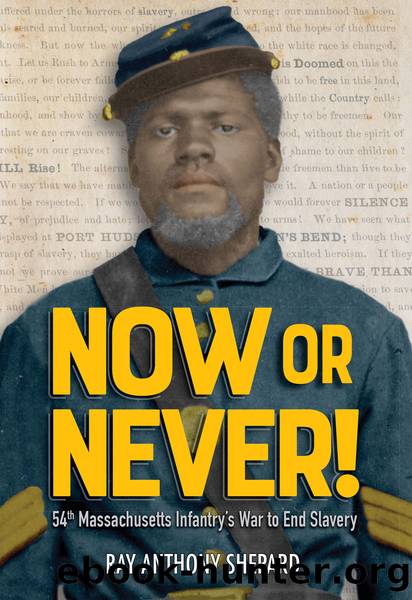Now or Never! by Ray Anthony Shepard

Author:Ray Anthony Shepard
Language: eng
Format: epub
Publisher: Astra Publishing House
Published: 2017-10-15T00:00:00+00:00
Before this, on August 7, nineteen days into the siege, the soldiers of the Fifty-Fourth had once again stood in front of the paymasterâs wagon. For the second time, regardless of rank, they were offered $10 a month minus $3 for uniforms, instead of the $13 White soldiers received for taking the same risks. Colonel Montgomeryâs Second Carolina accepted the $10. But when the Fifty-Fourth was asked, âAll who wished to take the ten dollars per month, raise your hand,â Gooding proudly told readers, âI am glad to say not one man in the whole regiment lifted a hand.â He concluded in his letter to the New Bedford Mercury: âToo many of our comradesâ bones lie bleaching near the walls of Fort Wagner to subtract even one cent from our hard earned pay.â
Stephens dismissed the payment as âinsultingâ to be offered âabout half the pay of a poor white private.â
Seven weeks later, tired of waiting for equal compensation, Gooding brushed the dirt from his pants and hands to keep from smudging his writing paper and sat outside his tent with a wood plank across his lap. He wrote to Abraham Lincoln. He began timidly, âYour Excellency,â and begged to be pardoned for âthe presumption of a humble individual.â But his writing grew stronger as he continued.
He asked, âAre we Soldiers, or are we Labourers?â Gooding reminded Lincoln that even though the African American had for two years been refused âthe privilege of aiding his Country in her need,â this day âhe is in the War, and how has he conducted himself? Let their dusky forms rise up, out [of] the mires of James Island, and give the answer. Let the rich mould around Wagnerâs parapets be upturned, and there will be found an Eloquent answer.â As his passion grew, he challenged: âNow your Excellency, we have done a Soldierâs Duty. Why Canât we have a Soldierâs pay?â
A White New York reporter had been covering the war on Morris Island. Gooding asked him to mail the letter to President Lincoln. He did not want the letter read by the army or the War Department. Letters to the president and commander-in-chief were expected to be approved by the regimental commander, then by the Union Armyâs Department of the South, and finally the War Department. Only then if all censors approved the letter would it be sent to the White House. Gooding violated the armyâs chain of command and dreaded that if caught he would end up bucked and gagged, or worse.
On September 30, after the siege, the paymaster returned a third time. Although penniless and with suffering families at home, the Fifty-Fourth refused to accept anything less than full pay. When Colonel James Montgomery heard of their third rejection, he stormed into camp and ordered the men to assemble. Dressed in full uniform, soldiers fell into formation and waited as the old colonel let them stew in the sticky South Carolina heat. Sweat trickled under Stephensâs woolen uniform and rolled down to his socks.
Download
This site does not store any files on its server. We only index and link to content provided by other sites. Please contact the content providers to delete copyright contents if any and email us, we'll remove relevant links or contents immediately.
Now or Never! by Ray Anthony Shepard(114)
Indian Culture by Anita Ganeri(82)
Fighting to Survive Animal Attacks by Nancy Dickmann(81)
Fighting to Survive in the Wilderness by Eric Braun(80)
A Century of Immigration: 1820 - 1924 by James Lincoln Collier(77)
Che Guevara's Face by Danielle Smith-Llera(76)
The Road to There: Mapmakers and Their Stories by Val Ross(76)
Inside a Gestapo Prison : The Letters of Krystyna Wituska, 1942-1944 by Krystyna Wituska; Irene Tomaszewski(73)
Dragons for Kids Mythology Books for Children Childrens Fantasy Books Edition by Speedy Publishing(72)
The Ghostly Tales of Long Island by Rachel Kempster Barry(69)
A Primary Source History of the Dust Bowl by Rebecca Langston-George(65)
Fighting to Survive Airplane Crashes by Sean McCollum(64)
A Primary Source History of the US Civil War by John Micklos Jr(63)
Lucius Fairchild by Stuart Stotts(62)
The Mounties by Elle Andra-Warner(62)
Explore the Ice Age! by Cindy Blobaum(60)
Apache Resistance by Pamela Dell(60)
The Ghostly Tales of Pittsburgh by Diane Telgen(60)
A Primary Source History of U.S. Independence by Krystyna Poray Goddu(59)
